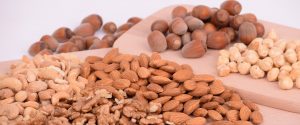5 Myths about Protein, Eating Too Much will Always Cause Kidney Failure!?

5 Myths about Protein, Eating Too Much will Cause Kidney Failure!?
How much protein should you consume? What is the best source of protein? Too much protein bad for you? There are too many myths about protein. But first, what is protein? It is a molecule composed of amino acids. It is also one of the three macronutrients (as well as carbohydrates and fats) that you need to consume every day. Protein is necessary for the structure, function and regulation of body tissues and organs.
Myth 1: All protein sources are the same
Not all protein sources are the same. There are 20 types of amino acids-some are necessary, while some are unnecessary. Our body produces 11 kinds of amino acids. However, our body cannot make the nine essential amino acids, so we need to obtain them from our diet. A protein source containing all nine essential amino acids requires a balanced absorption of meat, eggs, and milk.

Salmon
Myth 2: A high-protein diet can destroy your kidneys
One of the functions of our kidneys is to filter the by-products of protein metabolism and breakdown. But if you are healthy, eating more protein will not damage your kidneys. In a study published in the journal Nutrients in 2018, 310 diabetic men and women followed a specific weight loss plan for one year. Researchers found that intake of more than 1.6 grams of protein per kilogram of body weight per day (about twice the recommended daily intake) has nothing to do with decreased kidney function. A study in the International Journal of Sports Nutrition and Sports Metabolism in 2000 found that consuming up to 2.8 grams of protein per kilogram of body weight per day (almost four times the normal intake of protein) would not cause kidney damage. However, a very important exception is when you have chronic kidney disease. Discuss your protein intake with your doctor, as a high-protein diet may make your condition worse.

Milk
Myth 3: Too much protein can cause your osteoporosis
According to a study in Switzerland in 2011, intake of more than 2 grams of protein per kilogram of body weight per day and less than 600 mg of calcium per day may be harmful to bone mass and strength. For a person weighing 150 pounds (68 kg), this means eating more than 136 grams of protein (about three chicken breasts) but less than 600 mg of calcium. But if you pay attention to calcium intake, protein is actually good for bone health.
Myth 4: Your body cannot process more than 30 grams of protein
This myth comes from the fact that your body needs 30 grams of protein to maximize muscle protein synthesis (repair damaged protein and build new protein). According to Dr. Roussell, although 30 grams per meal is the best amount, consume more of that will not bring additional benefits. In a study published in the Journal of the American Dietetic Association, researchers gave 17 healthy adults and 17 healthy elderly people-or 12 ounces of beef. They then collected blood samples and biopsies of thigh muscles to assess the subjects’ protein synthesis after meals. In both age groups, a 12-ounce serving (approximately 90 grams of protein) caused the same increase in muscle protein synthesis as a 4-ounce (30 g) serving. This is not to say that your body cannot process the extra protein, it just doesn’t need it.

Myth 5: Avocado, chia seeds and hummus all contain protein
Unless you read the nutrition facts, else don’t believe that certain foods are important sources of protein. The whole medium sized avocado only contains 4 grams of protein. There are about three grams of chia seeds per tablespoon, so one teaspoon will not do much for you. After all, you can eat more than one kind of food in any meal, up to 30 grams. But if you are not sure how to get the protein you need, it is best to ask the dietitian.
*Follow Facebook
